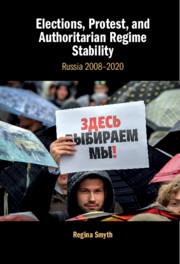Book contents
- Elections, Protest, and Authoritarian Regime Stability
- Elections, Protest, and Authoritarian Regime Stability
- Copyright page
- Dedication
- Contents
- Figures and Tables
- Acknowledgments
- 1 Elections, Protest, and Regime Dynamics
- 2 Winning Elections
- 3 The Long Game
- 4 The Unexpected Power of Weak Opposition
- 5 The Vote Protest
- 6 The Polls Close and Two Movements Emerge
- 7 Protest and Rally Dynamics
- 8 The Perpetual Campaign
- 9 2018–2020
- Book part
- References
- Index
5 - The Vote Protest
State, Opposition, and Voters in Russian Elections
Published online by Cambridge University Press: 16 October 2020
- Elections, Protest, and Authoritarian Regime Stability
- Elections, Protest, and Authoritarian Regime Stability
- Copyright page
- Dedication
- Contents
- Figures and Tables
- Acknowledgments
- 1 Elections, Protest, and Regime Dynamics
- 2 Winning Elections
- 3 The Long Game
- 4 The Unexpected Power of Weak Opposition
- 5 The Vote Protest
- 6 The Polls Close and Two Movements Emerge
- 7 Protest and Rally Dynamics
- 8 The Perpetual Campaign
- 9 2018–2020
- Book part
- References
- Index
Summary
Chapter 5 explores social response to the 2011 parliamentary election. These chapters are central to my explanation that links regime change to citizens’ action through opposition and regime strategies in elections. Based on unique original data supplemented with national surveys, this analysis provides the first systematic investigations of individual responses to the information revealed through electoral contests and the opposition call to protest. A crucial innovative feature of each of the chapters is that it considers the behavior of three groups: protesters, regime rally participants or ralliers, and nonparticipants. The first section of the chapter discusses opposition contestation over the vote protest concept and the most efficacious strategy to express dissent at the ballot box. The second section of the chapter explores the individual decision to engage in different protest strategies, showing that while vote protest did undermine regime support, the lack of opposition agreement on one strategy, obscured this information. Nonetheless, the vote protest laid the groundwork for post-election protest by raising awareness and engaging individuals in the process.
- Type
- Chapter
- Information
- Elections, Protest, and Authoritarian Regime StabilityRussia 2008–2020, pp. 101 - 128Publisher: Cambridge University PressPrint publication year: 2020

